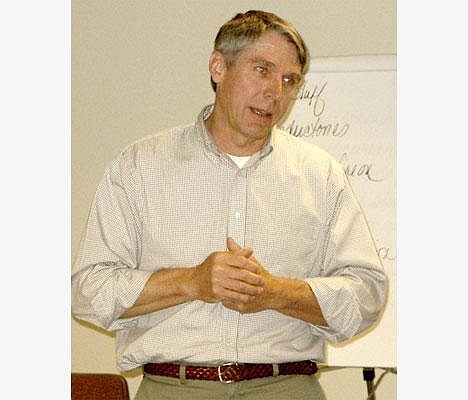Mike Dombeck: former Forest Service chief
Find common goals says former USFS chief
By STEVE KADEL Western News Reporter
Environmentalists and timber industry representatives must find common goals as they decide what they want the forests to be generations from now, a former U.S. Forest Service chief said Tuesday in Libby.
Mike Dombeck, who served as the agency's top administrator from 1997 to 2001, urged community cohesion during a symposium organized by the Yaak Valley Forest Council. About three dozen people attended the event at Lincoln County Campus.
Dombeck said cooperation on a local level is needed to avoid "political backwash" as power shifts in Congress and the White House.
"Forests are for the long haul, and it's very difficult to get government to think long haul," he said. "The most important question is what do you want this place to look like in 100 years."
If people don't cooperate with each other, he said, unpalatable solutions likely will be imposed from Washington, D.C.
"When there is disagreement locally you're just shoving the issue up to the next level," Dombeck said.
Longtime Libby resident Russ Hudson cautioned Dombeck that his goal won't easily be reached here.
"You are in a town that can do battle over anything," Hudson said. "Almost any issue raised in Lincoln County results in conflict."
Hudson added that solutions must come quickly, saying, "We are about to lose our infrastructure in Montana. We're on the threshold of losing our mills."
Robyn King, executive director of the Yaak Valley Forest Council, agreed with Dombeck that cooperation is vital to make progress.
"We need to have small mills that can process the fiber that comes off the Kootenai," she said. "The 2.5 million acres of federal land here is big enough to share."
In an interview, King said the council has been encouraging a community discussion on the value of collaboration for a couple of years. The council brought Dombeck to Libby to add another voice in the long-term talks, she said.
The former Forest Service chief also served as acting director of the Bureau of Land Management from 1994 until 1997. He has a doctorate in fisheries biology from Iowa State University, and grew up enjoying the woods of northern Wisconsin.
After a quarter century as a government employee in public lands management, Dombeck believes forest management is in transition.
"I think the future is stewardship contracting," he said. "I think the timber sale contract is a thing of the past. I think we need to change the lingo."
Dombeck describes stewardship contracting as a broader approach to managing forests than is provided in timber contracts. Besides board feet to be cut, he said, projects to keep watersheds healthy are stipulated in stewardship contracts. Part of the money from the sale goes back to the land in that way, he said.
Tom Maffei, the former forest timber management officer for Kootenai National Forest, said Lincoln County already is a leader nationwide in stewardship contracting, but that doesn't solve a bigger problem.
"The thing that has to get fixed first is the constant litigation we're in," said Maffei, who now works in the regional USFS office in Missoula. "We're paying out millions in attorney fees."
Lawsuits against the Forest Service stem from mistrust, particularly after over-harvesting during previous decades, Dombeck said.
"The only way I know to resolve that is by education," he said. "It will take a long time. Working together, building trust, will take some time. We're not going to rule-make our way out of it."
He noted that Forest Service officials have a much more difficult job than their counterparts in other agencies. National parks and wildlife refuges are easier to manage, he said, because they have a single mandate.
"This multiple-use mandate is difficult because everybody wants a share," he said of the USFS role.
Lee Disney, chairman of Lincoln County Resource Advisory Council, suggested the RAC could serve as a referee for those considering lawsuits - hearing issues before they reach court.
"We started out with the idea of working together, and we're doing pretty good," he said.
Bob Castenada, supervisor of the Kootenai National Forest, said he's encouraged by cooperation he's seen lately. The Forest Plan Revision now under way is another chance for local citizens to tell the Forest Service what they want for the Kootenai, he said.
"Steward contracts aren't easy and they don't belong everywhere," Castenada added. "But we're looking at two or three more of them next year. We're finding out where they fit best.
"I'm more optimistic about our communities and how we manage our land than I have been in several years," he said. "The future is as bright as I've seen it."

